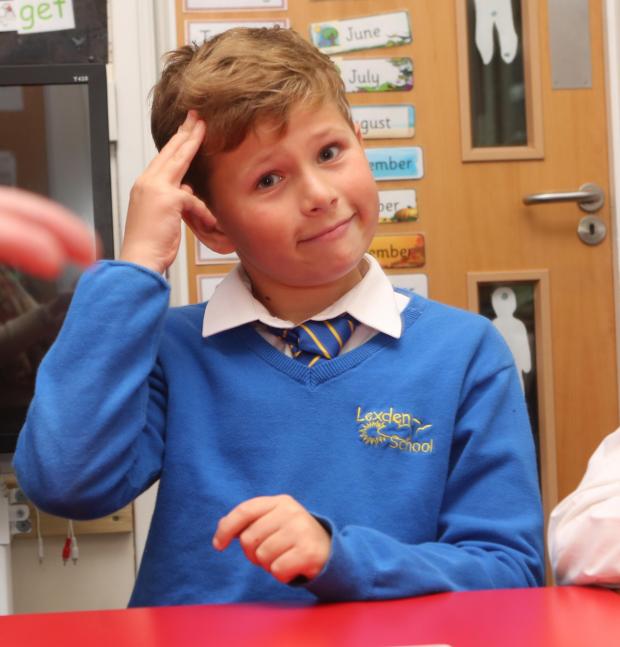Blog
-

DEAF children not being able to enjoy and participate in music activities is a huge misconception.
 12 Dec , 2017
12 Dec , 2017
DEAF children not being able to enjoy and participate in music activities is a huge misconception.
Having a hearing impairment alters the sounds but it does not stop the child-like desire to thump on a drum, or to feel the sensations created by different instruments.
At Lexden Primary School’s Unit for Hearing Impaired Pupils, music therapy is being used to help build confidence and resilience among its young people.
A donation from the Colchester and Tendring Deaf Children’s Society means its 14 pupils, who have between moderate and profound hearing loss, will get to become rockstars for two days.
Although the ethos of the primary school is centered on inclusivity so ordinarily the hearing impaired pupils are not segregated from their hearing peers, when it comes to learning and playing music, solo, in a sense, works best.
Debbie Newbold, head of the enhanced provision, said: “Deaf children are unable to access speech and music through their ears alone, they need it through amplification.
“Hearing sounds through a cochlear implant produces quite a metallic sound and hearing aids don’t enable a person to know how loudly they’re producing sounds.
“In the context of a music lesson, it means our pupils can’t tell if they’re singing in tune, for example, or if they’re playing a piece of music off-beat and it becomes hard for them to follow the pace and rhythm.
“Because the sounds are being amplified in their personal aid, whether an implant or behind the ear hearing aids, it’s hard to follow a tune and how music fits into the bigger picture when performing with others.
“Within a school situation, this can be quite a challenge for them so we tend to find deaf children are quite inhibited when it comes to music.
“Therefore holding sessions in small groups where they can have free reign to try, play and record their own music can be very beneficial.”
When the sessions start next term, it will be the second occasion the students, aged up to 11, have worked with a professional music therapist who is able to progress their learning better than most.
Working together like a band, they have a chance to compose and play music before recording it and watching it back.
This is a novelty compared to practicing with hearing children who can naturally race through music.
Debbie said: “It works a lot on their listening skills, their ability to recognize different instruments and rhythms, and to feel the vibrations of things, particularly the drums.
“The therapist uses technology like iPads to compose with and can overlay different sounds, so the money from the charity will fund the expertise and equipment that the school doesn’t have access to.
“Parents of deaf children make up Colchester and Tendring Deaf Children’s Society.
“Some of their children were once pupils here or are still at the unit so they understand this is an area we want to develop.
“The children greatly enjoy it and talk about it for ages afterwards.”
No child at the unit is completely dependent on sign language.
Some were born without hearing and others have lost their hearing over time, but everyone is encouraged to make best use of aids to help them access the world around them.
Hearing loss can be extremely isolating.
Missing sounds hampers a person’s understanding of what is happening around them which can then lead to social exclusion and affects a child’s resilience, and self-esteem, early on in their development.
She said: “Music plays such an important part in people’s lives so we want to still give our pupils some of that although they can’t hear it properly.
“Music therapy can increase anyone’s capacity for learning and coping within a learning environment.
“Separating the children means the deaf pupils can take their time and really feel the music in an emotional way.”
Many of the people in north Essex are unaware the unit exists, according to Debbie, but it has been in existence for 50 years.
It is staffed by three teachers of the deaf and seven teaching assistants, who treat the deaf pupils just the same as hearing pupils.
She said: “They are just children who can’t hear, they can be as silly and naughty as everyone else.
“The children have low starting points when they join us in nursery or reception, but experience accelerated progress during their primary school years and leave Year Six with similar attainments as hearing pupils.
“Hearing loss in a child can affect their overall development of how they learn language.
“We have a firm belief in building confidence and learning resilience so can achieve as much as their hearing peers.”
With a number of Year Six pupils leaving soon, Debbie hopes to see the unit at full capacity with 18 eager pupils.
Places are available for children who have been diagnosed with a hearing impairment and Debbie wants the community to be more aware of her fantastic facility.
She said: “Deafness is a low-incidence disability. Most people aren’t aware but for 95 per cent of hearing families with a deaf children, they will be the first one within a family.
“If a deaf person can’t report the conversation, they will give up trying, so socially and emotionally we try to bring about opportunities for our pupils to socialize with others so they’re happier to initiate conversations, and feel included.
“For all of us here who have worked with children for a long time, you really see them grow and blossom.”
Source: Gazette Standard
Image credit: Jack Gilbertson, Gazette Standard





























































































































































































































































































































































































































































































































































































